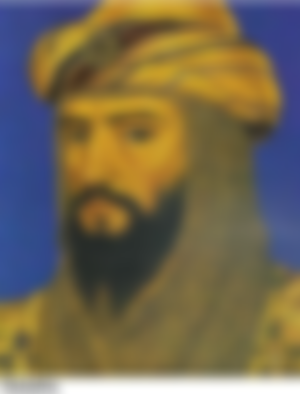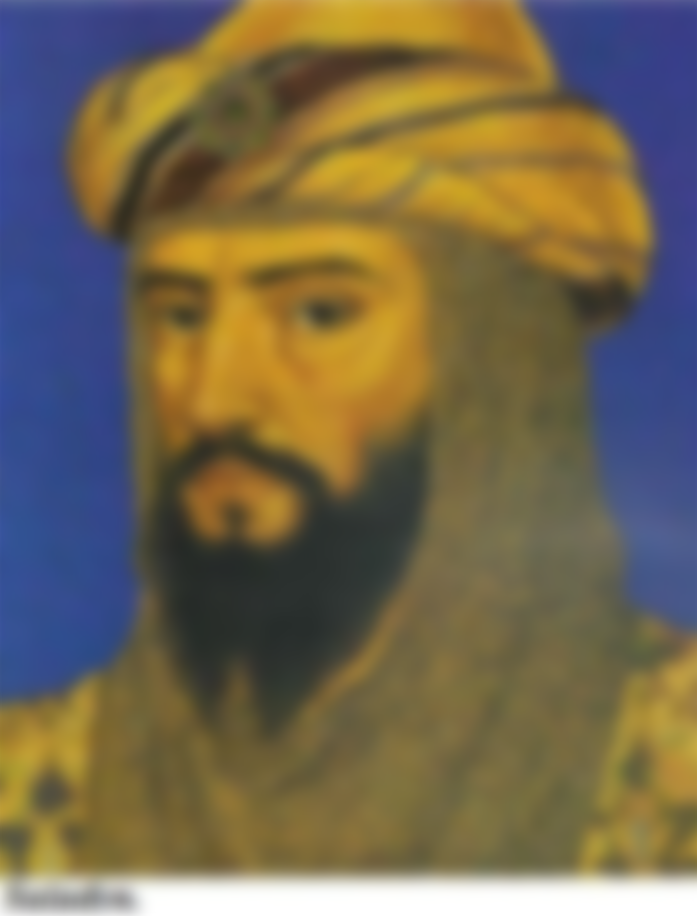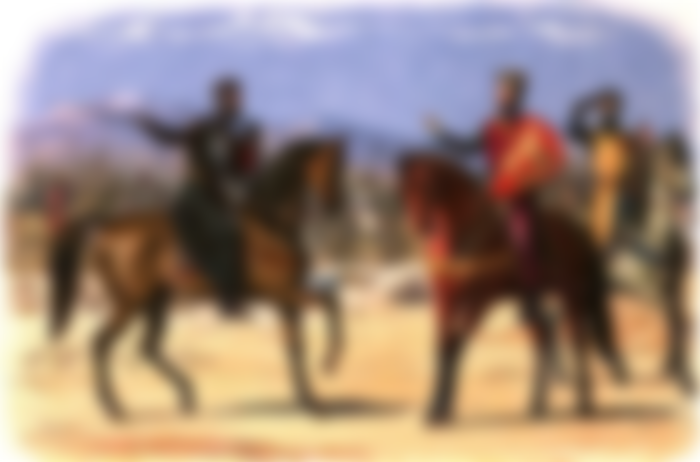Al-Malik al-Nasir Salah ad-Din Yusuf ibn Ayyub, or simply Saladin, was born in 1138 in Iraq in present-day Tikrit. As one of the sons of General Najm ad-Din Ayyub, of Kurdish descent, he spent his childhood in Damascus, at the court of Nur ad-Din, Nuredin, the ruler of Syria, after whose death he became sultan of Syria and Egypt.

At the height of his power, Saladin ruled Egypt, Syria, Iraq, and Yemen, but he was better known to the Western world as the Muslim ruler who offered the strongest resistance to the Crusaders and marked the beginning of the end of their conquests. At the same time, with his generosity and justice, the Sultan gained such a reputation in Europe that legends, anecdotes and poems circulated about him, and Dante included him among the souls of the virtuous pagans in Limbo in his Divine Comedy. It is said that the medieval knights learned the most about chivalry from Saladin, because thanks to both Christian and Arab biographers, he grew into the ideal of chivalry.

Saladin was not power-loving by nature, and he comes to the throne because he is taking the right steps at the right time. He always attributed the credit for his endeavors to God. Simple and modest, he would probably be content with a much smaller role than destiny intended for him. Physically, Saladin was the opposite of a knightly archetype: he was dark-skinned, short, thin, and always had a neatly trimmed beard. Otherwise he was prone to getting sick. In his approach to people, he was kind, approachable, always cheerful and smiling. He talked to learned as well as ignorant people with the same simplicity. He was not hasty, but when he punished, he was consistent and hit unmistakably. He was strict and fair, but first to himself.
He proved to be very capable in running the country. It can be said that during Saladin order and justice reigned. He considered money a means to an end and said it was like sand in a fist - it slides through fingers no matter how hard a man tries to keep it. At a time when rulers viewed coming to power as a means of gaining material benefits, Saladin had almost no private property. The castles and palaces he received he mostly distributed to members of his relatives which he placed in high positions. Saladin's generosity was a character trait that people around him, whether Christians or Muslims, knew how to make good use of.
The conquest of Jerusalem

Consolidating his rule, Saladin tackled the then-burning Middle East issue: the European invaders in Palestine. The Kingdom of Jerusalem, founded by the Knights Crusaders after the First Crusade in 1099, could be opposed by a powerful Islamic force. Until Saladin's time, the Crusaders held the Holy City of Jerusalem for almost a century, and they would have kept it longer if he had not strongly opposed them.

Saladin acted relentlessly. Before the fight began, he offered all the inhabitants free passage with all their property if they handed over the city to him, and in return promised that all Christian holy places would remain intact and that they would be able to visit and pray on them without hindrance. October 1187, after 88 years of Christian rule, enters the city victoriously.

The military receives strict orders to respect Christians and their holy places. Unlike the Christian conquest, Saladin's conquest is remembered for the strict observance of this commandment. Saladin, the chroniclers write, did not want anyone to remember the conquest of the Holy City by the "orthodox" for breaking a given promise.
The Third Crusade

The Muslim conquest of Jerusalem in the Christian world resonated strongly and started the Third Crusade. On the other hand, Saladin’s indulgence resulted in Tire becoming a new Christian stronghold for attempts to regain lost possessions.
In this war, the Christians managed to conquer the city of Accra and the coastal part of Palestine, but they failed to achieve what they came for - to reconquer the Holy City of Jerusalem. Saladin found a worthy opponent in King Richard the Lionheart of England, who was the commander-in-chief of the Christian army during the Third Crusade. Their mutual battles, though sometimes very violent, always carried the spirit of chivalry. During the war they kept a very lively correspondence through which they got to know each other well and gained mutual respect. So on one occasion, seeing that he had lost a horse in battle, Saladin sent a new one to Richard, and when Richard was wounded, Saladin offered him the services of his personal physician. It was a relationship of mutual military competition, but also of respect, a relationship that very well outlines the characters of the two opponents. victorious ”.

The Arabs celebrate him as their hero, the one who united the Muslims around a common goal - the conquest of Jerusalem, which was as sacred to Muslims as it was to Christians and Jews. On the other hand, although he thoroughly thwarted the crusades in the Holy Land and was their angry enemy, his name was remembered in Europe for his resolute resistance to Richard the Lionheart, but even more for his nobility and humanity.

He was buried in the garden of the Umayyad Mosque in Damascus where his mausoleum is still located today, on the site where the Temple of Jupiter once stood, then the Christian Church and today the Mosque.







